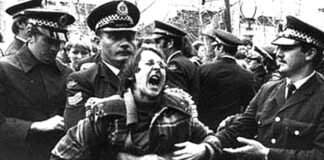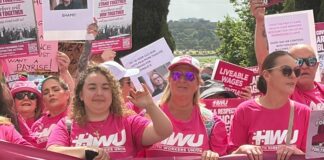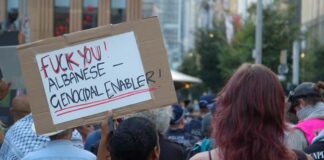Aung San Suu Kyi’s National League for Democracy (NLD) has won 80 per cent of the vote in Burma’s November national elections. This is a significant political defeat for the military junta after decades of authoritarian rule. But Suu Kyi’s commitment to neo-liberalism and her unwillingness to challenge anti-Muslim policies mean it is unlikely to translate into major social changes.
The junta is hoping to maintain significant power despite sharing control with an elected government. It will retain control of the Interior, Defence and Border Ministries as well as Burma’s extensive deep state apparatus. One quarter of the seats in parliament have been reserved for military officers and are not elected. Suu Kyi herself is banned from becoming president under a clause in the constitution specifically designed to exclude her.
Burma has been under local military rule since 1962, when General Ne Win used ethnic conflict as an excuse to overthrow the civilian government. He banned political parties, took control over private media, nationalised businesses and claimed to stand for a “Burmese road to socialism”.
In practice he used this to eliminate virtually all ruling class rivals to the power of the military. To consolidate his rule the army shot 100 student protesters and blew up the student union at Rangoon University.
The biggest challenge to the military’s rule came in 1988, after a change to currency regulations which wiped out people’s savings. A student protest and then a general strike forced Ne Win to resign, in spite of military repression which killed 3000 people.
Suu Kyi was able to put herself at the head of this movement, at one stage addressing a crowd of half a million. She led the NLD (a grouping of leftist intellectuals and former military officers) and had credibility as the daughter of Aung San, who had been assassinated in 1947 after leading the struggle against British colonialism.
But rather than push to topple the regime as a whole, Suu Kyi told demonstrators to wait for elections. She was put under house arrest and the elections didn’t happen until 1990. The NLD won them overwhelmingly but in the absence of a mass movement the junta simply held onto power.
It is not clear to what extent the junta will allow a transfer of power to the NLD this time. But in recent years their political approaches have converged significantly. In 2011 the regime introduced sweeping economic changes opening Burma up to foreign capital. The military see political reforms as a way to end decades of isolation and economic boycotts against the country.
The Australian government has been leading the Western response to take advantage of this by “normalising” diplomatic relations with the junta and weakening sanctions against them. ANZ and Woodside Petroleum are among the Australian businesses hoping to cash in on Burma’s rich natural resources and anticipated rates of growth of 10 per cent or more. Suu Kyi has long been in favour of aligning Burma with the West and away from China.
Rohingya pogroms
Like the British before them, the generals have maintained control through divide and rule. Ethnic “Burmese” (or Bamar, who are generally Buddhist) make up about two-thirds of the population and are privileged over racial and religious minorities.
Since 2012, pogroms by Buddhist extremists have forced more than 150,000 Rohingya Muslims to leave Burma. The regime does not acknowledge the Rohingya as Burmese citizens, and restricts their rights to marry, have children, and even to travel from one village to another, although the overwhelming majority have never lived outside Burma. Before the election the government struck hundreds of thousands of Muslims from the electoral roll.
Suu Kyi has said nothing about these abuses, and did not call for Rohingyan refugees to be rescued earlier in the year when they were left stranded in the Andaman Sea.
When asked about the Rohinyga after their election victory, a spokesperson said the NLD “have other priorities”, and that “we have to deal with the Bangladesh government because almost all of them came from there”. Suu Kyi herself has also suggested that the Rohinyga are from Bangladesh and not Burma, echoing the regime’s excuse for leaving them stateless.
Any weakening of the junta’s repressive grip on power is a good thing, but Suu Kyi’s preparedness to share power with the army makes major steps in this direction unlikely. Real change for workers and oppressed minorities in Burma will depend on rekindling a mass movement like the events of 1988 with a leadership committed to a revolution that goes beyond toppling the military.
By Peter Jones





